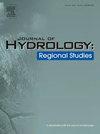评估水文气候因子对地表水质量的影响:全球综述与综合
IF 5
2区 地球科学
Q1 WATER RESOURCES
引用次数: 0
摘要
研究区域-全球,重点是受水文气候变率影响的不同气候和地理区域。本文综合考虑自然气候变率和人为气候变化,研究了降水、温度、径流和流量等水文气候参数对地表水质量的影响。它综合了71项采用PRISMA指南的同行评议研究的发现,重点是方法方法和影响WQ的关键水文气候驱动因素。研究结果表明,水文气候因子对流域整体WQ状态和个体WQ参数有显著影响。虽然降水和温度被广泛研究,但风速和相对湿度等变量仍未得到充分研究,这可能限制了对气候- wq相互作用的理解。大多数研究依赖于统计或水文模型,这些模型往往无法捕捉复杂的非线性关系。先进的机器学习(ML)和人工智能(AI)方法的集成在提高预测准确性和发现隐藏模式方面显示出希望。然而,很少有研究评估多种水文气候变量的累积效应或协同效应。未来的研究应采用多学科综合的建模框架,以更好地表征气候变化情景下的动态相互作用。长期环境监测和适应性管理战略对于增强WQ复原力至关重要。据作者所知,这篇综述是第一次全面评估多种水文气候驱动因素对地表WQ的相互作用,为更明智的水资源管理和气候适应政策提供重要见解。本文章由计算机程序翻译,如有差异,请以英文原文为准。
Assessing the impact of hydro-climatic factors on surface water quality: A global review and synthesis
Study region
Global, with emphasis on diverse climatic and geographic regions impacted by hydro-climatic variability.
Study focus
This review investigates the influence of hydro-climatic parameters—such as precipitation, temperature, runoff, and streamflow—on surface water quality (WQ), incorporating both natural climatic variability and anthropogenic climate change. It synthesizes findings from 71 peer-reviewed studies using PRISMA guidelines, focusing on methodological approaches and key hydro-climatic drivers affecting WQ.
New hydrological insights for the region
Findings reveal that hydro-climatic factors significantly impact individual WQ parameters and overall WQ status. While precipitation and temperature are widely studied, variables like windspeed and relative humidity remain underexplored, potentially limiting the understanding of climate–WQ interactions. Most studies rely on statistical or hydrological models, which often fail to capture complex, nonlinear relationships. The integration of advanced machine learning (ML) and artificial intelligence (AI) methods shows promise in improving predictive accuracy and uncovering hidden patterns. However, few studies assess the cumulative or synergistic effects of multiple hydro-climatic variables. Future research should adopt multidisciplinary, integrated modeling frameworks to better represent dynamic interactions under climate change scenarios. Long-term environmental monitoring and adaptive management strategies are essential for enhancing WQ resilience. To the best of the authors’ knowledge, this review is among the first to comprehensively assess the interplay of multiple hydro-climatic drivers on surface WQ, offering critical insights for more informed water resource management and climate adaptation policy.
求助全文
通过发布文献求助,成功后即可免费获取论文全文。
去求助
来源期刊

Journal of Hydrology-Regional Studies
Earth and Planetary Sciences-Earth and Planetary Sciences (miscellaneous)
CiteScore
6.70
自引率
8.50%
发文量
284
审稿时长
60 days
期刊介绍:
Journal of Hydrology: Regional Studies publishes original research papers enhancing the science of hydrology and aiming at region-specific problems, past and future conditions, analysis, review and solutions. The journal particularly welcomes research papers that deliver new insights into region-specific hydrological processes and responses to changing conditions, as well as contributions that incorporate interdisciplinarity and translational science.
 求助内容:
求助内容: 应助结果提醒方式:
应助结果提醒方式:


